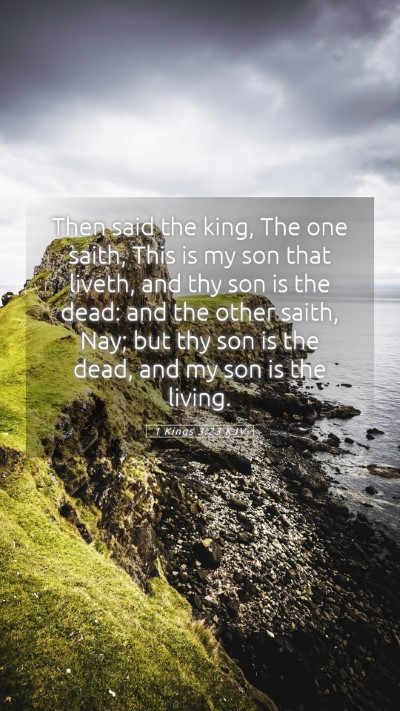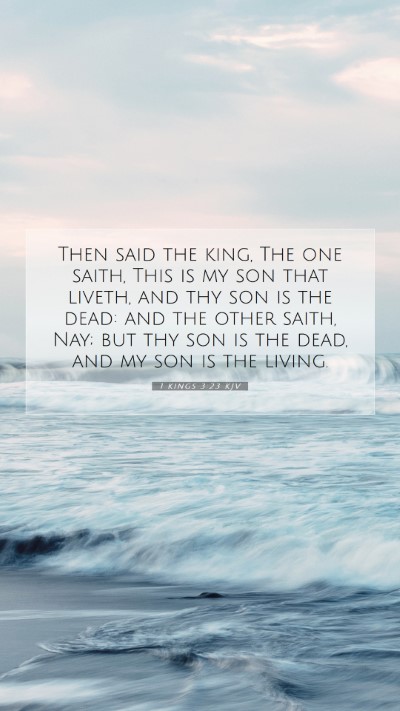Bible Verse Commentary: 1 Kings 3:23
Understanding the context and meaning of 1 Kings 3:23 can provide profound insights into biblical wisdom and discernment.
Verse Reference
1 Kings 3:23: "Then said the king, The one saith, This is my son that liveth, and thy son is the dead: and the other saith, Nay; but thy son is the dead, and my son is the living."
Overview of 1 Kings 3
The chapter of 1 Kings 3 marks a pivotal moment in the reign of King Solomon, addressing his request for wisdom to govern Israel. This request follows a divine encounter whereby God grants him the wish for wisdom, and the subsequent events demonstrate its application in real-life scenarios.
Summary of the Passage
- Wisdom Granted: Solomon famously asks for an understanding heart to discern between good and evil as he rules God's people.
- The Case of Two Mothers: The passage centers on a dramatic case of two women claiming to be the mother of the same child, showcasing Solomon's wisdom.
- Discernment and Justice: This story illustrates not only Solomon's remarkable decision-making abilities but also highlights deeper themes of maternal love and the importance of justice in leadership.
Commentary Insights
Matthew Henry's Commentary
According to Matthew Henry, the careful discernment exhibited by Solomon is a reflection of the divine wisdom he received. It illustrates the necessity and significance of wisdom in governance and highlights the moral integrity required of those in leadership positions. Henry also emphasizes the miraculous use of wisdom in solving disputes and the underlying themes of love and sacrifice within this narrative.
Albert Barnes' Commentary
In Albert Barnes' analysis, he interprets Solomon's wisdom not merely as an intellectual gift, but as a spiritual endowment, granting him the insight to judge human nature accurately. Barnes points out the tension between the claims of the two women, which exposes the depths of commitment from each. This analysis reinforces the understanding of how wisdom can lead to truth and resolution in difficult situations.
Adam Clarke's Commentary
Adam Clarke approaches the verse by noting the dramatic nature of the claimants' arguments and Solomon's clever means of uncovering the truth. He comments on the moral of the story, focusing on themes of deception versus truth, and the lengths one will go to safeguard their love for their child. Clarke also emphasizes how Solomon's actions resonate beyond the singular incident, providing a blueprint for resolving disputes and establishing justice.
Significance of the Verse
The significance of 1 Kings 3:23 transcends its immediate narrative, serving as a rich source for bible verse meanings, bible verse interpretations, and practical bible study insights. The insights gathered here can aid individuals, particularly those engaged in bible study groups or online bible study, in grasping deeper theological concepts and applying them to daily life.
Key Themes and Lessons
- The Role of Wisdom: Solomon's request for wisdom demonstrates its paramount importance in effective leadership.
- Moral Integrity: The story emphasizes the ethical considerations in resolving conflicts and making just decisions.
- Maternal Love: The depth of a mother's love is exemplified, showing the powerful emotions that can influence human decisions.
- Justice and Truth: The resolution of the dispute functions as a powerful reminder of the need for justice and truth in society.
Application to Daily Life
Applying the insights from 1 Kings 3:23 to daily life can transform how we approach justice, discernment, and relationship dynamics. When faced with disputes, one can seek wisdom and clarity, reminiscent of Solomon's judicial approach. Being attuned to the nuances of human affection and the complexities of situations can foster empathetic and just resolutions in our own lives.
Cross References
- Proverbs 2:6: "For the Lord gives wisdom; from His mouth come knowledge and understanding."
- James 1:5: "If any of you lacks wisdom, let him ask of God, who gives to all liberally and without reproach, and it will be given to him."
- Ecclesiastes 3:16-17: "Moreover, I saw under the sun: In the place of judgment, wickedness was there; and in the place of righteousness, iniquity was there..."
Conclusion
In conclusion, 1 Kings 3:23 serves as a foundational text that offers rich Bible verse explanations and serves as a launchpad for deeper Bible study topics. By engaging with this verse through the lens of wisdom, justice, and maternal love, readers can enhance their understanding of Scripture and apply these themes in meaningful ways in their lives.


